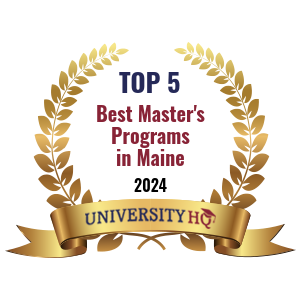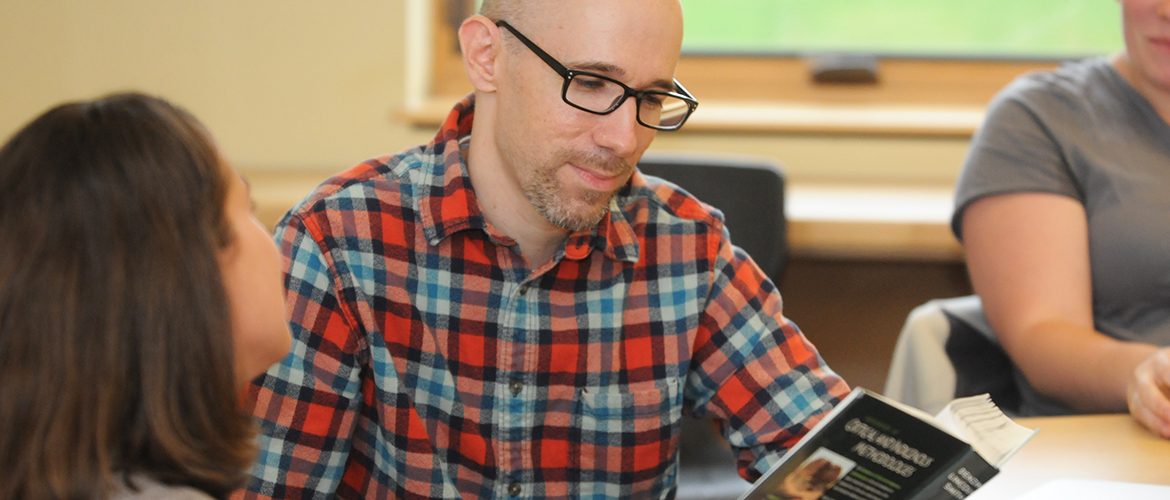Special Education teachers are in high demand throughout the state of Maine. With a Master’s in Special Education from UMF, you’ll be able to decide where you want to go and what you want to do.
The Master of Science in Education (M.S.Ed.) in Special Education builds on the success of UMF’s Special Ed Alternate Route to Certification (SPARC) program and UMF’s national reputation for transformational undergraduate teacher education.
It provides a 4+1 pathway for UMF undergraduate students AND supports the needs of public school personnel interested in teaching and leadership roles in special education.
Apply Now Request More InformationProgram at a Glance
- Convenient blended format: 70% online / 30% face-to-face
- Many concentration courses fully online
- 33 graduate credit hours, including 12 credit hours of a rigorous core curriculum
- 6 specializations to choose from, each 21 credits
Questions? Email the Division of Graduate and Continuing Education at gradstudies@maine.edu.

Among Maine’s Top Master’s Degree Programs
UMF is rated by University Headquarters as having some of the Best Master’s Degrees in Maine (#2 overall). University Headquarters is an industry-leading, independent educational organization that compiles a comprehensive set of information for students who wish to pursue an advanced degree.
In-Person and Online: The Best of Both Worlds
The master’s program is taught in-person and online, with roughly 30% of the program taught in-person and 70% online. Typically, the 30% face-to-face instruction takes place over the course of 3 Saturday classes per semester.
Our graduates have consistently told us that this format allows them to experience the best of both worlds: the convenience of online education with the ability to make connections and expand your professional network through face-to-face interaction.
Curriculum
The Master’s in Special Education (M.S. Ed.) program is structured around 33 graduate credit hours. This includes 12 credit hours of rigorous core curriculum and the choice between 5 Specializations that are 21 credit hours each.
Core Curriculum Requirements: 12 credits
- SED 551: Advanced Intervention Methods
- SED 598: Inclusive Education Reform: a Social Justice Approach to School and Systemwide Reform
- EDU 582: Research Methods in Education
- SED 586: Special Education Research
- Internship (varies, based on Specialization)
To see course descriptions please review the Graduate Catalog.
The Teacher Certification Track specialization is designed for in-service and pre-service educators seeking certification as a teacher of students with disabilities (282 certification). Courses are chosen in consultation with your academic advisor to ensure state certification requirements are met and professional goals are reached.
Courses
- SED 503 Preparing Students for the Future: Transition programming, self-determination and advocacy (required for 6-12 certification)
- SED 505 Universal Design for Learning and Curriculum Access
- SED 506 Assessment in Special Education
- SED 507 Curriculum and Instructional Programming for Students with Disabilities
- SED 508 Classroom and Behavior Management of Students with Disabilities
- SED 511 Mathematics Instruction for Students with Disabilities
- SED 513 Early Childhood Speech and Language: Development, Disorders, and Interventions
- SED 514 Literacy Development for All Students
- SED 518 Special Education Law
- SED 529 Individualized Positive Behavior Supports
To see course descriptions please review the Graduate Catalog.
This specialization prepares students to work in K-12 schools and other education-centered contexts in a variety of inclusive roles. We develop teachers, leaders, and change-agents who can effectively assess students and understand diverse needs, develop instruction and supports that are universally designed and differentiated, understand multicultural perspectives, and collaborate with colleagues and communities to increase inclusion for youth who struggle or who have traditionally been marginalized.
A year-long internship in schools or other approved organization will provide students with diverse experiences to prepare them for future careers as:
- inclusive special or general education classroom teachers
- inclusive education specialist or consultants
- teacher leaders and department chairs
- inclusive specialists at research and advocacy organizations
- inclusive specialists at community centers, agencies, or non-profit organizations
- school administrators.*
* Note: This specialization does not lead to Maine’s Special Education administrator certification; students interested in Special Education Administration should consider our Special Education Administrator specialization.
Courses
- SED 598 Inclusive Education Reform: a Social Justice Approach to School and Systemwide Reform
- SED 599 Advanced Inclusive Ed: Gaining Access to Inclusive Education and Community
- SED 505 Universal Design for Learning and Curriculum Access
- EDU 551 Changing Educational Organizations in a Diverse World
To see course descriptions please review the Graduate Catalog.
This specialization provides the prerequisite courses, knowledge base, and internship experience needed to be certifiable as a Special Education Administrator. Candidates will develop an understanding of the theoretical bases and practical application of Special Education Administration and be well-prepared to lead effective, inclusive Special Education programs. Upon completion of the program, graduates are eligible to be certified as a Special Education Administrator in the state of Maine (035 certification).
Courses
- EDU 550 School Law for Administrators
- EDU 551 Changing Educational Organizations in a Diverse World
- EDU 552 Supervision and Evaluation of School Personnel
- EDU 553 Finance for School Administrators
- EDU 554 Internship in School Leadership
To see course descriptions please review the Graduate Catalog.
Students seeking in-depth study on a specific topic or topic in the field of special education will work with an advisor to develop a program plan. Students identify a Self-Designed specialization and propose courses to complete to fulfill requirements for the self-designed specialization. Self-designed specializations may include, for example: literacy in special education, special education research, emotional/behavioral disorders, multi-tiered systems.
In partnership with the University of Maine, the Low Incidence Disabilities specialization focuses on preparing educators to deliver high quality, inclusive educational services, supports, and interventions to students with extensive support needs including physical disabilities, intellectual disabilities, and autism. Upon completion of the program, students are eligible for state certification as a teacher of students with low incidence disabilities (286 certification).
Courses
Course information coming soon
Application Process & Due Dates
All applicants are strongly encouraged to contact the Division of Graduate & Continuing Education office prior to application to discuss the program and professional goals. Call us at 207-778-7502 or email us at gradstudies@maine.edu.
Applications are accepted on a rolling basis, and will be considered when complete. Students may enroll in some courses as a non-matriculated student prior to acceptance into the program.
Due Dates
- Spring Term: December 9
- Summer Term: April 24
- Fall Term: August 14
How to Apply
To apply for the M.S.Ed. in Special Education, you will need to provide the following to the Division of Graduate & Continuing Education:
Please email completed forms to: gradstudies@maine.edu
Please provide official transcripts from each institution you have attended (including both the undergraduate and graduate level). Official transcripts must be sent directly from the institutions to the UMF’s Office of Graduate Studies. If you attended a UMaine System school (UMA, UMF, UMFK, UMM, UM, UMPI, or USM), the Office of Graduate Studies can obtain your transcript for you.
We are looking for candidates with the potential to work effectively with students with disabilities in K-12 schools and ensure their meaningful access to a high quality, inclusive education.
Please write a brief (1,000 word limit) essay in which you discuss your academic and professional goals and identify how this degree program addresses those goals.
Two recommendations are required.
- One from a current administrator (assistant director/director of Special Education, assistant principal/principal)
- One from a professional colleague of your choosing
- 4+1 applicants – One recommendation must be from a university faculty member or recent supervisor/administrator who can speak to your potential for completing graduate work.
- Please provide each reference with a copy of the blank recommendation form.
Download Recommendation Forms>>
Note: This is a fillable form, and you may need to download it to enable it.
Please submit a copy of your Maine DOE certification.
If you are requesting a self-designed specialization, then you will need to provide us with supplemental information.
Please submit the following additional information as part of your application essay:
- Propose a title for the focus of your specialization (e.g., behavior supports, low incidence disabilities, transition, mathematics).
- List the courses you have taken that you are requesting for transfer. Include course prefix, title, institution, and grade received. (Official transcripts and syllabi are required for final decision regarding transfer of credit.)
- List the courses you may take at UMF to complete the specialization (refer to UMF’s graduate catalog).
- What knowledge and skills do you hope to obtain? How would this focus promote your growth as a special educator? Identify the specific areas (1-2) of expertise (e.g., transition services, literacy, mathematics, behavior supports) you would hope to develop as part of this self-designed option.
If you are requesting that graduate-level coursework be transferred from another institution into this UMF Master’s program, in addition to your transcript you must submit the syllabi for each course you would like considered for transfer. Transfer decisions are made at the time of admission.
These credits must have been earned from a regionally accredited institution, within 5 years prior to admission, and with a minimum grade of B (or equivalent). Graduate credits applied toward an undergraduate degree cannot be used toward the Master’s degree.
University of Maine at Farmington. Make the Most of Your Education.
Getting a master’s is a big deal, so make the most of your education with a quality program at nationally recognized University of Maine at Farmington. Well-known for excellence in teacher education, UMF offers a number of graduate programs for teaching professionals, including 5 on-campus Master’s degree programs, 10 different Graduate Certificate programs, a 100% online Master’s program, a Special Education Alternative Route to Certification, and more. We also offer a new Master’s in Counseling Psychology with a Creative Arts Focus that provides a solid clinical foundation while integrating the creative arts into the practice of counseling and psychotherapy.
The Division of Graduate & Continuing Education is at the center of UMF’s commitment to collaboration with teachers working in Maine’s Pre K-12 schools. This commitment finds life in programs that have a long history of quality, as well as new programs that are developed each year in response to needs voiced by the Pre K-12 community.
The University of Maine at Farmington is accredited by the New England Commission of Higher Education (NECHE).


